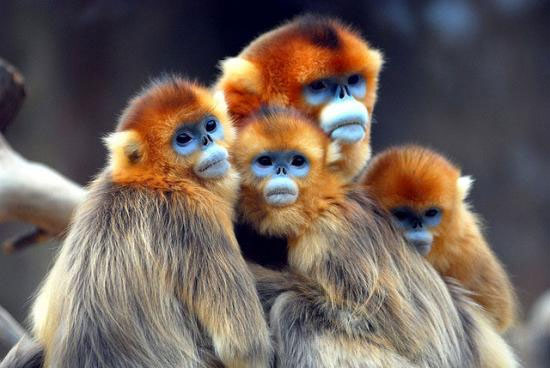Human neuron detection in monkey brain
German scientists found that in the brain golden macaques (macaca) have neuron (neurons) only in humans, monkeys in humans, whales and elephants, related to self-awareness.
This was discovered by Henry Eurad and colleagues of the Institute of Biological Control and published in the Journal of Neuron.
Von Ekonomo neurons , also called rhombus neurons, were first described in 1929. These are unique cells that are three times larger than pyramid-shaped neurons and located deep in the cortex.

Scientists have found neurons that are only found in humans in golden monkeys.
Neither Von Ekonomo has the shape of a reel, is responsible for quick information processing and the development of social relations. They also help transfer nerve signals into deep parts of the brain.
Problems in the development of spinning-shaped neurons are related to diseases such as language disorders and thinking and social communication restrictions. In Alzheimer's disease a large proportion of these neurons in front of the cortex are also killed.
Eurard and colleagues also found similarities between spinning-shaped neurons in the cortical part of the macaca's forehead. This part has an important role in self-awareness, emotions, especially love, hate, confidence .
If this cortical part is not stable, it will lead to indifference, inability to determine the feeling of placing yourself in the context of another person or the interlocutor. These are also common signs in people with autism.
Scientists believe that studying neuron-like neurons and their association with other regions in the monkey's brain may help to explore the evolution of human self-awareness, the cause of the disease. autism and ways to treat harmful habits such as drug and tobacco addiction.
- Find the algorithm to simulate the human brain, but no machine can operate
- The mysterious area in the human brain was first known
- Scientists discover that the old brain always produces new cells
- Human face reconstruction from monkey brain signal
- Supercomputer simulation ... the world's strongest human brain
- Video: Human brain size compared to other animals
- Compare human brain with supercomputer
- Compare the power of human brain and computer
- What makes humans different from the rats?
- The human brain has been reduced to 14 billion neurons
- Published a map of human brain
- Genetics of the brain can cause disease
 Green tea cleans teeth better than mouthwash?
Green tea cleans teeth better than mouthwash? Death kiss: This is why you should not let anyone kiss your baby's lips
Death kiss: This is why you should not let anyone kiss your baby's lips What is salmonellosis?
What is salmonellosis? Caution should be exercised when using aloe vera through eating and drinking
Caution should be exercised when using aloe vera through eating and drinking